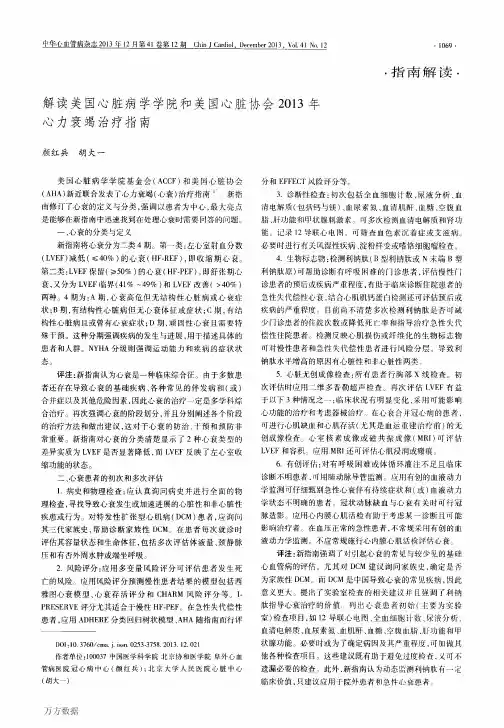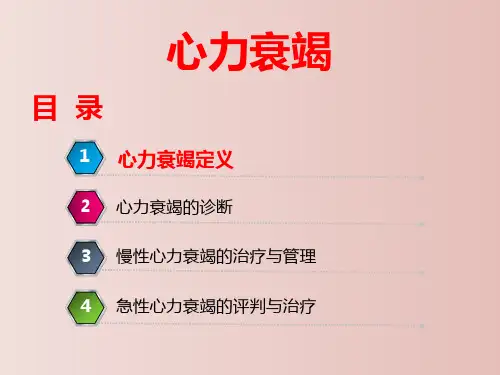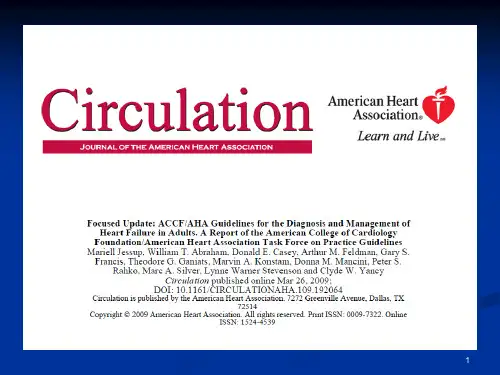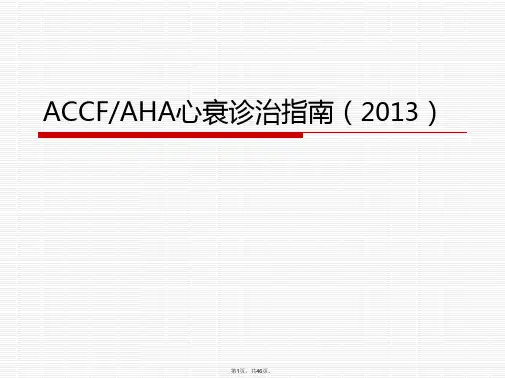2013年美国心力衰竭管理指南(心衰指南)课件
- 格式:ppt
- 大小:2.69 MB
- 文档页数:134











2013 ACCF/AHA Guideline for the Management of Heart Failure: A Report of the American College of Cardiology Foundation/American Heart Association Task Force on Practice Guidelines.2013ACCF/AHA心力衰竭管理指南目录表前言1. 介绍1.1. 方法学和证据审查1.2. 编写委员会的组织1.3. 文件审查和批准1.4. 本指南的范围,参考了其他相关指南或科学声明2.HF的定义3.HF的分类4.流行病学5.HF患者的初始评估和系列评估:推荐5.1. 临床评估5.1.1. 病史和体格检查5.1.2. 危险评分5.2. 诊断试验5.3. 生物标志物5.4. 非侵入性心脏显像5.5. 侵入性评估6. 从A阶段到D阶段的治疗:推荐6.1. A阶段6.2. B阶段6.3. C阶段6.3.1. 非药物干预6.3.2 .C阶段HFrEF的药物治疗6.3.3. C阶段HFpEF 的药物治疗6.3.4. C阶段HFrEF 的装置治疗6.4. D阶段6.4.1. 限水6.4.2. 正性肌力药物的支持6.4.3. 机械循环支持644 心脏移植7.住院的患者:推荐7.1. 失代偿性HF的诱因7.2. 住院期间GDMT的维持7.3. 利尿剂治疗住院的患者7.4. 肾替代治疗——超滤疗法7.8. 精氨酸加压素拮抗剂8.HF重要的合并症9.HF的手术/经皮/经导管介入治疗:推荐10.对慢性HF患者的协调护理:推荐11.质量指标/性能测量:推荐12.证据的差距和将来的研究方向缩略语ACE = 血管紧张素转换酶ACS = 急性冠脉综合征AF = 心房颤动ARB = 血管紧张素受体阻滞剂BMI = 体质指数BNP = B型利钠肽BTT = 桥接移植CABG = 冠状动脉旁路术CAD = 冠心病CPAP = 连续气道正压通气CRT = 心脏再同步化治疗DCM =扩张型心肌病ECG =心电图EF =射血分数GDMT = 指南导向药物治疗HbA1c =血红蛋白A1cHF = 心力衰竭HFpEF = 射血分数保留的心衰HFrEF = 射血分数降低的心衰HRQOL = 健康相关生活质量ICD =植入式以及转律除颤器LBBB = 左束支传导阻滞LV = 左心室LVEF = 左室射血分数MCS = 机械循环支持MI = 心肌梗死NSAIDs = 非甾体类抗炎药NT-proBNP = N-末端利钠肽前体NYHA = 纽约心脏协会PUFA = 多不饱和脂肪酸RCT = 随机对照试验SCD = 心源性猝死V AD = 心室辅助装置参考文献前言对于评估与疾病检出、管理和预防的药品、装置和操作相关的证据,医学界应起到核心作用。
2013美国心脏病学院/美国心脏协会关于心力衰竭的治疗指南概要梁峰胡大一沈珠军姚远一、前言2013年美国心脏病学院基金会(ACCF)和美国心脏协会(AHA)制定了心力衰竭(HF)的治疗指南,更新了2009年版,进行了大幅变动,几乎是完全再版。
指南指出HF不是死亡判决,有效的干预可以使部分患者增加数年有质量的寿命。
新版首次尝试“指南导向药物治疗(GDMT)”的概念,以及聚焦射血分数保留的HF(HFpEF)。
重要的是指南试图给出大多数情况下满足多数患者需要的实践,特定患者的诊疗必须由临床医生根据具体情况决定,可偏离指南。
二、HF患者起初和系列连续性评价(一)临床评价1. 病史和体格检查规范推荐I类推荐:对以HF就诊的患者应该获得/进行全面的病史和体格检查,以便确定心脏或非心脏的疾病或表现导致或加重HF的发生或进展(证据级别:C)。
特发性扩张型心肌病(DCM)患者,应该获得3代人的家族史,有助于确立家族性DCM的诊断(证据级别:C)。
对每一位患者应进行容量状态和生命体征的评价,包括体重的连续测量,以及颈静脉压力的估测和周围水肿或端坐呼吸(187-190).(证据级别:B)。
2.风险计分推荐IIa类推荐:公认的多变量风险计分可能有助于估测门诊或住院HF患者随后的死亡风险。
(二)辅助检查的推荐I类推荐:以HF就诊患者的最初实验室检查评价包括全血细胞计数,尿液分析,血清电解质(包括钙和镁),血尿素氮,血清肌酐,血糖,空腹血脂谱,肝功,以及促甲状腺激素(证据级别:C)。
如果合适时,进行连续的血清电解质和肾功能监查(证据级别:C)。
以HF就诊的所有患者最初应进行12导联心电图检查。
IIa类推荐:对选择性HF就诊的患者进行血色沉着病或艾滋病病毒筛选是合理的(证据级别:C)。
HF就诊的患者,临床疑似风湿性疾病,淀粉样变性或嗜铬细胞瘤时,进行此方面的辅助检查是合理的(证据级别:C)。
(三)生物标记物检查的推荐1.门诊推荐I类推荐:呼吸困难的门诊患者,脑尿钠肽(BNP)或血清N末端脑钠尿肽前体(NT-proBNP)的检查,对HF的诊断尤其临床不确定时,有助于临床决策的制定(证据级别:A)。